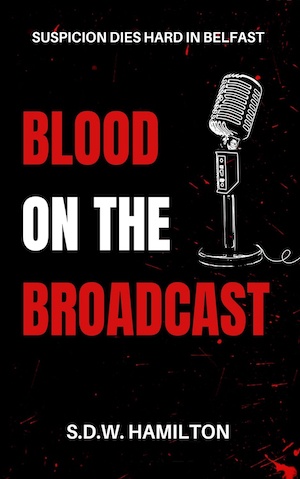
There’s religious strife brewing in Belfast, but it’s not what you might expect. A group known as the Followers of Eden have been operating in and around the city for years, although their power and influence have reached significant heights of late. Led by shadily charismatic American expat Seymour Huber and sponsored by the likes of millionaire property developer Ivan Gould, the Followers are said to engage in “coercion, extortion, intimidation, money laundering. Anything you can think of.”
For reasons unknown, shy young journalist Roisin Dunwoody had committed to building a case against the group and, when no mainstream media outlets would touch the story, approached former colleague Natalie Amato for help. The creator of the Miss Gumshoe true crime podcast, Natalie agreed to dedicate a series of episodes to exposing the Followers. The series was a major hit, pulling in serious audience numbers and finally indicating some official oversight of the cult.
Sadly for Roisin, her success was short-lived. She was found dead at home the morning after the final episode on the Followers was released. She’d been drinking with the Miss Gumshoe crew the night before and the police have written off her death as an accident, the result of a head injury sustained after a fall in her hallway, likely after slipping on some spilled wine. It’s a logical conclusion, given that Roisin died alone in her locked fourth-floor apartment, but Natalie is convinced that her death was far from natural.
With nowhere else to turn, Natalie hires former police officer turned private investigator Jacob Kincaid to look into Roisin’s death. Jacob is missing being on the job and fed up of tailing cheating spouses, although Natalie’s background check on him suggests that the odd interesting case does come his way, including the intriguing sounding disappearance of a painting from the Red Door Art Gallery. He’s not convinced there’s anything suspicious about Roisin’s death – what with the locked room aspect and all – but agrees to take the case.
SDW Hamilton’s Blood on the Broadcast is a pitch-perfect slice of Northern Ireland noir by an author with extensive knowledge and a clear love of the subgenre. As Jacob and Natalie pursue their limited solid leads and their growing list of suspicious characters, they and the story criss-cross Belfast and its surrounds, including a trip or two down the infamous (in crime fiction circles at least) Botanic Avenue. The city serves as almost an additional character throughout, and a very well fleshed out one at that.
The shadows of recent history never seem very far away in fiction set in Belfast; however, while Hamilton makes reference to the Troubles and the continuing spillover effects of the religious-political divide, he concentrates far more on the nature and atmosphere of contemporary Belfast. The city is changing fast and there’s some serious money to be made, although certain neighbourhoods are definitely being left behind, including the one where Jacob has his office, which doesn’t help business.
This construction boom links back to the Followers of Eden through one of their major funders, although the cult seems to have plenty of influence in other spheres of life too. It would have been useful to have clearer insight into how the group became so firmly entrenched in Belfast society so quickly, especially when there were a fair few other things occupying the city elites at the time. This would better explain the reluctance of the authorities to investigate the Followers, despite the many rumours of nefarious activities.
As a group, the Followers seem to reflect some of the most shocking stories seen about Scientology – there’s even a Shelly Miscavige-style missing mother – albeit with a good deal of common or garden gang-related thuggery mixed in. While it would have been enlightening to learn more about the inner workings of the cult and the personality of Seymour Huber in particular, Hamilton’s focus on the criminal aspects of the story keeps the Followers realistic and grounded.
The way in which the group has been operating in Belfast for years, extending its influence without much public awareness, is reflected in the fact that Jacob, as a former police officer and current private detective, is aware of the group and the major players in it, but not of its full reach and purpose. This does necessitate a tad too much exposition during the early stages of the story as Natalie brings him up to speed about Roisin’s death, the Followers, and other matters.
Still, while the pace of the story is not always as successful as the tone, the early lags in action and intrigue are quickly overcome once Jacob’s investigation moves beyond the research stage and onto active pursuit of the killer. Hamilton has crafted a clever locked-room mystery for him to solve, but despite this classic crime fiction element, the story definitely abuts hardboiled territory, with Jacob actively leaning into the tropes associated with Philip Marlowe and Sam Spade, although he does so with knowing humour.
Blood on the Broadcast is a gripping and neatly twisting detective story that cleverly meshes elements from classic and hardboiled crime fiction and firmly situates them in a realistic contemporary setting. There are plenty of valid suspects and a decent amount of likely motives, and the case is certainly a difficult one to crack. There’s scope for a series featuring Jacob Kincaid, especially given the tantalising references to previous cases that Hamiliton includes throughout, so it’ll be interesting to see what the future holds for Belfast’s newest private investigator.
Also see The Detective Up Late by Adrian McKinty and Alternative Ulster Noir edited by Simon Maltman.
Wedge
Print/Kindle
£1.99
CFL Rating: 4 Stars
Order a copy on Amazon.co.uk or Amazon.com. Using our affiliates / associates links helps support the site.








